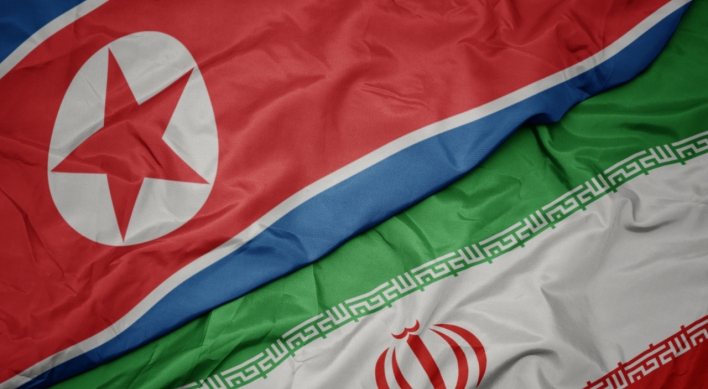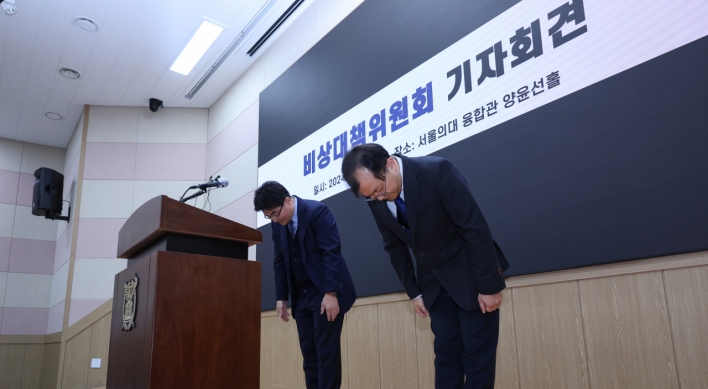Safety concerns are mounting over preparations to send South Korean medical teams on their first trip to West Africa to help treat Ebola patients.
Following the South Korean government’s announcement on Monday that it would send a group of medical officials to Ebola-hit countries next month, local experts expressed worries about the lack of safety training to guard against the deadly virus among health-care workers here.
Shin Hyun-young, a physician and the spokeswoman for the biggest representative body of South Korean doctors, said that there are currently no guidelines for the nation’s health-care providers about putting on and removing personal protective equipment.
“Safety is only guaranteed when the gear is worn properly and removed without touching the contaminated surfaces, and this needs repeated training,” she said.
Following the South Korean government’s announcement on Monday that it would send a group of medical officials to Ebola-hit countries next month, local experts expressed worries about the lack of safety training to guard against the deadly virus among health-care workers here.
Shin Hyun-young, a physician and the spokeswoman for the biggest representative body of South Korean doctors, said that there are currently no guidelines for the nation’s health-care providers about putting on and removing personal protective equipment.
“Safety is only guaranteed when the gear is worn properly and removed without touching the contaminated surfaces, and this needs repeated training,” she said.

Safety concerns about health-care workers treating Ebola patients are being raised in the U.S. too, as two nurses were infected after caring for a Liberian man who died from the deadly virus at a hospital in Dallas this month.
Nina Pham, one of the nurses who contracted the virus, was infected despite taking the correct precautions by wearing full protective gear.
The U.S. Centers for Disease Control and Prevention on Monday issued new, stricter guidelines for health-care workers treating Ebola patients, calling for them to be fully covered with no skin exposed, undergo repeated training, and receive supervision while wearing and removing their protective equipment.
The virus is spread by direct contact with bodily fluids of infected patients, such as blood, sweat, saliva or semen.
In response to the safety concerns, Health Minister Moon Hyung-pyo said that the Korea Centers for Disease Control and Prevention has come up with a training program, which involves putting on and taking off protective equipment that is painted with specially colored fluid.
“If they take the protective gear off and have any of the fluid on their skin, they fail the training program,” the minister said in a meeting with reporters in Sejong City on Tuesday.
Moon said South Korea is sending some 20 medical professionals ― 10 medical doctors and about 10 military health-care professionals ― to West Africa next month, and the team will help treat Ebola patients until January.
“Sending a team of medical experts to West Africa is a preventative measure, as this contributes to eradicating the virus in the affected countries,” the minister said.
All the team members will be recruited from volunteers, preferably those with experience treating infectious diseases, Moon said.
Since Ebola patients only become contagious once the disease progresses to the point of showing symptoms, health-care workers treating them are among the most vulnerable, even if they wear protective gear.
To date, no South Korean health-care worker has treated an Ebola patient.
By Claire Lee (dyc@heraldcorp.com)



![[Exclusive] Korean military set to ban iPhones over 'security' concerns](http://res.heraldm.com/phpwas/restmb_idxmake.php?idx=644&simg=/content/image/2024/04/23/20240423050599_0.jpg&u=20240423183955)
![[AtoZ into Korean mind] Humor in Korea: Navigating the line between what's funny and not](http://res.heraldm.com/phpwas/restmb_idxmake.php?idx=644&simg=/content/image/2024/04/22/20240422050642_0.jpg&u=)

![[Graphic News] 77% of young Koreans still financially dependent](http://res.heraldm.com/phpwas/restmb_idxmake.php?idx=644&simg=/content/image/2024/04/22/20240422050762_0.gif&u=)




![[Pressure points] Leggings in public: Fashion statement or social faux pas?](http://res.heraldm.com/phpwas/restmb_idxmake.php?idx=644&simg=/content/image/2024/04/23/20240423050669_0.jpg&u=)







![[Today’s K-pop] Ateez confirms US tour details](http://res.heraldm.com/phpwas/restmb_idxmake.php?idx=642&simg=/content/image/2024/04/23/20240423050700_0.jpg&u=)